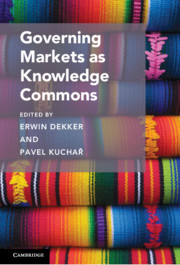
Knowledge commons facilitate voluntary private interactions in markets and societies. These shared pools of knowledge consist of intellectual and legal infrastructures that both enable and constrain private initiatives. This volume brings together theoretical and empirical approaches that develop and apply the Governing Knowledge Commons framework to the evolution of various kinds of shared knowledge structures that underpin exchanges of goods, services, and ideas. Chapters offer vivid and illuminating case studies that illustrate this conceptual framework. How did pooling scientific knowledge enable the Industrial Revolution? How do social networks underpin the credit system enabling the Agra footwear market? How did the market category Scotch whisky emerge and who has access to it? What is the potential of blockchain-ledgers as shared knowledge repositories? This volume demonstrates the importance of shared knowledge in modern society.
Contents
Introduction by Erwin Dekker and Pavel Kuchař
The Contribution Good as the Foundation of the Industrial Revolution by Terence Kealey and Martin Ricketts
On the Social Evolution of Knowledge by Renée Prendergast
Individual Sovereignty and Coproduction of Knowledge Governance by Edward J. López
Common Sense Commons: The Case of Commonsensical Social Norms by Brett Frischmann
Conventions as Shared Cognitive Infrastructures by Young Back Choi
Property Rights, Knowledge Commons, and Blockchain Governance by Darcy W. E. Allen, Chris Berg, Sinclair Davidson, and Jason Potts
Knowledge Commons, Social Infrastructures, and Informal Markets: The Case of Informal Trade Credit in India by Yugank Goyal
Entrepreneurship and Governance in the Scotch Whisky Knowledge Commons by Michelle Albert Vachris and Kyle Vachris
Trolling in the Deep: Managing Transgressive Content on Online Platforms as a Commons by Julien Gradoz and Raphaël Raux
Crowdfunding the Queer Museum: A Polycentric Identity Quarrel* by Carolina Dalla Chiesa
Understanding Different Qualities of the Knowledge Commons in Contemporary Cities by Youn Sun Won and Arjo Klamer
About the Editors and Contributors
Editors
Pavel Kuchař is a Lecturer in the Department of Political Economy, King’s College London
Contributors
Darcy W. E. Allen is a Senior Research Fellow at the RMIT Blockchain Innovation Hub
Chris Berg is a Principal Research Fellow at RMIT University
Carolina Dalla Chiesa is a Lecturer at Leuphana University Lüneburg
Young Back Choi is Professor of Economics at St. John’s University
Sinclair Davidson is a Professor of Institutional Economics at RMIT University
Yugank Goyal Associate Professor – Public Policy at FLAME University
Julien Gradoz is a PhD candidate at Université de Lille
Terence Kealey is Professor of Clinical Biochemistry at the University of Buckingham
Arjo Klamer is Professor of Cultural Economics at Erasmus University
Edward J. López is a Professor of Economics at Western Carolina University
Jason Potts is Distinguished Professor of Economics at RMIT University
Renée Prendergast is a Reader in Economics at Queen’s University Belfast
Raphaël Raux is a PhD candidate at Harvard University
Martin Ricketts is Professor of Economic Organization at the University of Buckingham
Kyle Vachris is an economist at the United States Bureau of Labor Statistics